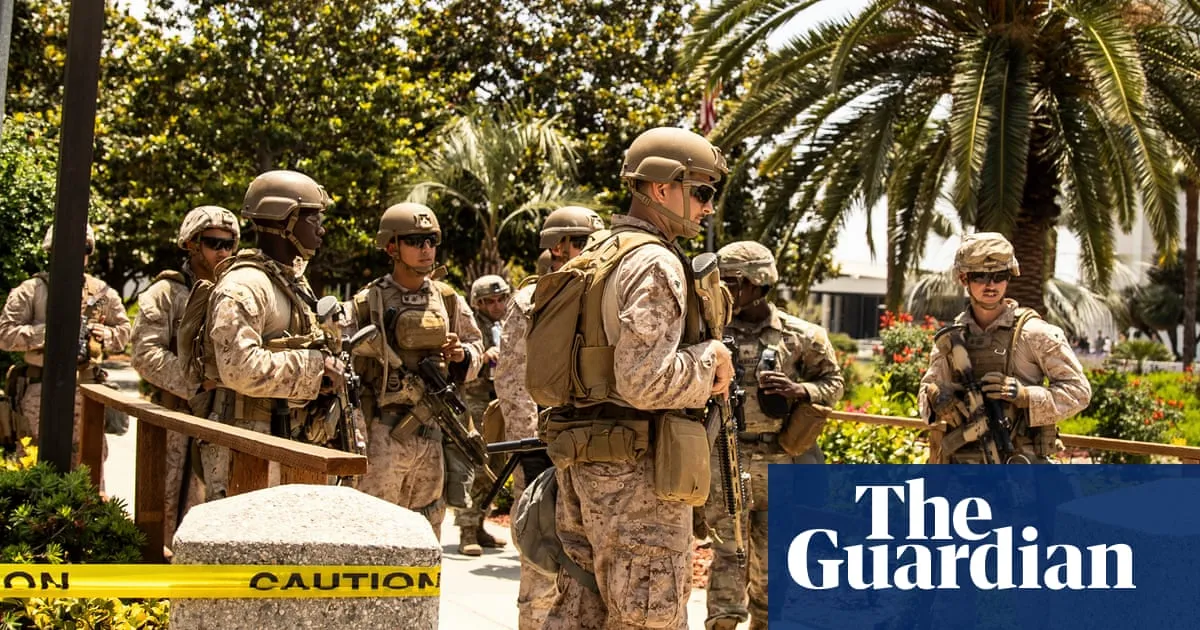
A federal judge has declared that the Trump administration’s deployment of National Guard troops during immigration enforcement protests in Southern California was illegal. Judge Charles Breyer issued the ruling on Tuesday, stating that the actions taken by the administration violated federal law by sending troops to assist federal agents in immigration raids.
Despite the ruling, Judge Breyer did not mandate the immediate withdrawal of the remaining troops. The state of California initiated legal action, arguing that the troops dispatched to Los Angeles over the summer were in violation of a law that prohibits military involvement in domestic law enforcement. In defense, lawyers for the Republican administration contended that the Posse Comitatus Act did not apply in this case, as the troops were allegedly protecting federal officers rather than enforcing laws. They asserted that the troops were mobilized under a presidential authority that allows for their deployment.
Judge Breyer, who was appointed to the federal bench during former President Bill Clinton’s Democratic administration, ruled that the deployment of the National Guard troops breached an 1878 law that generally prohibits federal troops from participating in civilian law enforcement activities. Breyer emphasized the intentional nature of the deployment, stating, “Defendants instigated a months-long deployment of the National Guard and Marines to Los Angeles for the purpose of establishing a military presence there and enforcing federal law. Such conduct is a serious violation of the Posse Comitatus Act.”
The judge has paused his order until Friday, providing the Trump administration an opportunity to appeal before it takes effect. The Trump administration has been engaged in a comprehensive crackdown on immigration, specifically targeting Democrat-run cities and threatening to utilize the National Guard while increasing the number of federal agents involved in various operations.
President Trump has openly discussed the potential for further National Guard deployments in cities such as Chicago, Baltimore, and New York. Additionally, he previously deployed the National Guard as part of an unprecedented law enforcement takeover in Washington, D.C., where the President holds direct legal control. The decision to send National Guard troops into Los Angeles, without the consent of state and local officials, sent shockwaves through American politics.
California Governor Gavin Newsom and other Democratic leaders have sharply criticized the Trump administration's actions, labeling them as an alarming abuse of power. Trump ordered the deployment of 2,000 National Guard troops in June following two days of clashes between demonstrators and U.S. immigration authorities. This marked a significant escalation in the ongoing immigration crackdown, which had already triggered widespread protests across the country.
Trump's federalization of guard troops represents a historical precedent, as it is the first time a President has utilized such authority since the 1992 LA riots, which erupted in response to the acquittal of four white police officers involved in the brutal beating of Black motorist Rodney King. Notably, this year did not witness a comparable level of unrest in Los Angeles.
On August 11, Trump again ordered the deployment of more than 2,200 soldiers from states including Mississippi and Louisiana to Washington, D.C., following his declaration of a “crime emergency” in the nation's capital. Concurrently, the U.S. Department of Transportation took over management of Union Station, Washington’s primary railway terminal, from Amtrak, citing concerns related to safety and infrastructure needs.
This report was contributed by the Associated Press.